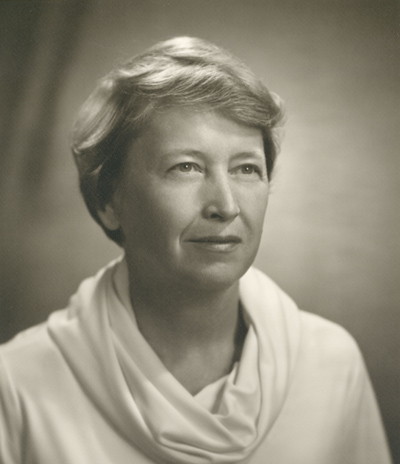 |
| “She blazed a trail for female physicians to follow - and defined her own balance.” |
Mary Langston Parker was born November 14, 1924 in Inverness, Florida. She graduated from Florida State College for Women with a bachelor’s degree in 1946, completing her Master’s of Science degree in Chemistry in 1949 from what is now Florida State University. Advised by her physiology professor to apply to Washington University, her application was highly successful – she was awarded the Jackson Johnson scholarship and received her MD cum laude in 1953. One of only four women in her graduating class, she completed an internship in pediatrics at St. Louis Children’s Hospital in 1954. Following her internship, she and her husband took their family to Saipan where Dr. Charles Parker worked as an internist for the Navy.
During her medical school training, Parker trained in the laboratory of Dr. William Daugherty where she developed her strong interest in endocrinology. In 1960, she returned to the lab as a U.S. Public Health Service trainee in Metabolism. Tasked with developing a method by which growth hormone levels in childhood growth failures could be measured, she was instrumental in developing a radioimmunoassay for quantitative assessment of hormone levels in blood. Parker joined the faculty at Washington University as a Research Instructor in 1962, becoming an Assistant Professor of Pediatrics, Endocrinology and Medicine in 1965.
In 1968, Parker accepted a position as a staff physician that led to her appointment as Director of Student Health Services in 1971. Parker worked tirelessly to make her service student oriented. As director, Parker was respected and admired by her staff, one of whom noted that “She was an inspired choice for director.” Her pioneering and continuous efforts to generate the best possible health care for the students, faculty and staff of Washington University earned her both accolades and respect from all those who worked with her and benefited from her inspired leadership. She retired as Professor emerita of Preventive Medicine in 1990.
Mary Parker was not content to follow a linear career path, noting that she never had a job that she didn’t like. Her career path encompassed research, clinical medicine and health service administration in addition to wife and mother and she did every job with gusto. Advising those who follow her to carefully consider the long-term consequences of their decisions, her legacy is that of retaining a passion for her science, her patients, her family and her outside interests throughout her career. In addition to her pioneering research, her commitment to student health, and her love of family, Parker is a craftswoman: an avid wood turner.
While she was concerned about heckling when she began medical school, Parker has never felt that her progress was impeded by overt prejudice based on her sex. None-the-less, she recounts being told after one medical school admissions interview that she would not be accepted because accepting a woman who would not use her degree would deny a man a place in the profession of medicine. Far from finding this analysis daunting, Parker used it to advise her children that acceptance to medical school included the obligation to use their degree fully. This is advice that Parker herself followed in full measure.
Parker approached her career with an openness to opportunity that resulted in her appointment as Director of Student Health Services. In this position, she served with true distinction due to her abilities as a manager, her energy and strong work ethic, and her respect for those whose welfare was her concern. It is this enthusiastic embrace of all that her career encompassed that is her greatest legacy to those who will come after her.
